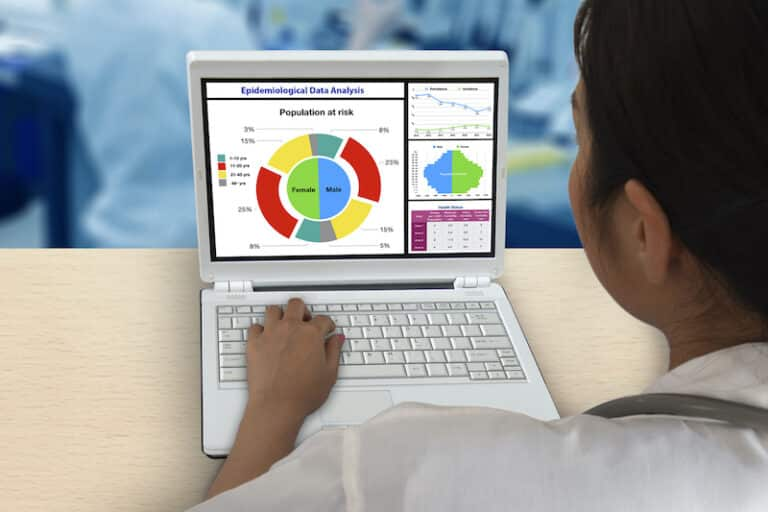Discover Options for Health Care Careers
Nursing and Health Sciences are some of the most important fields in modern healthcare. Nursing and health sciences professionals must be knowledgeable about techniques for promoting health maintenance, disease prevention, diagnostic techniques, and current technology.
Nursing and health sciences students gain an understanding of how professional roles can interact within a healthcare team setting, develop essential communication skills, and understand research methods. They also become proficient in evidence-based practice, comprehend cultural considerations in the healthcare environment, and apply principles of management and leadership. Furthermore, they learn techniques for health promotion, disease prevention, and disease management as well as understanding public health initiatives.
Top Degree Programs
All Related Programs

Focus on Nursing
Nursing in the healthcare sector focuses on the care of individuals, families, and communities so they may attain, maintain, or recover optimal health. Nursing and health sciences have evolved significantly since Florence Nightingale first developed her healthcare theories in the 1800s.
Nursing today requires critical thinking skills to accurately assess patient needs using evidence-based practice guidelines to develop an effective plan of care for each individual patient’s situation.
Nurses practice autonomous and collaborative care of individuals in all age groups. They promote health, prevent illness, and coordinate care for patients with complicated health conditions.
Adding Value to Patients' Lives in Nursing and Health Sciences
Nursing and health sciences go hand in hand. Nursing features a long history as one of the oldest healthcare professions. It is valued for its clinical expertise along with the compassion and commitment extended to patient care.
Nursing Specializations
Those with an interest in nursing will find opportunities for many healthcare specializations including:
- Gerontology
- Psychiatric/mental health
- Obstetrics/gynecology
- Pediatrics
- Public health
- Community health
- Acute care
Nursing Health Education
Nurses undergo extensive clinical training in their nursing education to become capable health care experts. They learn to correctly assess a patient's condition, interpret diagnostic results, and develop individualized care plans. In addition, they study how to administer medications safely, evaluate the effectiveness of treatments, and perform physical exams.
Students can also develop real-world experience through internships, volunteering, and community service. In addition, these professional organizations can help students build a thriving network. Some of these include:
- American Association of Colleges of Nursing (AACN)
- American Nurses Association (ANA)
- National League for Nursing® (NLN) NLN is a registered trademark of the National League for Nursing.
- National Student Nurses Association
Learn More About our Master's in Nursing
Nursing is more than just administering medications or providing basic health care. It involves helping people with their health-related needs, promoting measures for good health, and taking the necessary steps to ensure patients remain healthy and cared for in the future.
Nursing is a fundamental aspect of healthcare systems around the world and nurses play an integral role in patient care. Students with nursing knowledge can explore more non-traditional roles in nursing informatics, including electronic medical records management, telehealth, medical writing, health coaching, and healthcare consulting.
Nursing is both an art and science: it requires knowledge of medical practices combined with compassion for patients. Nursing is an incredibly rewarding and satisfying profession that allows nurses to make a meaningful difference in the lives of their patients.

Explore Health Sciences in the Health Care Sector
Health sciences is an interdisciplinary field that deals with the application of knowledge from natural and social sciences. It is used to promote health among populations through the prevention of disease as well as proper diagnosis and treatment.
The field draws upon research from many disciplines such as medicine, psychology, environmental studies, mathematics, sociology, and anthropology. Professionals in health sciences must have an understanding of how biological processes interact with environmental factors like diet, lifestyle choices, genetics and pollution to influence patients’ overall well-being.
Potential Roles in Health Sciences
Students take courses in epidemiology, sociology, and psychology, nutrition, exercise science, and public health to develop an understanding of population health. Students who pursue an education in health sciences gain knowledge and skills often required in fields such as medicine, physical therapy, and occupational therapy. Examples include:
- Community health or public health worker
- Mental health counselor
- Patient care advocate
- Physical or occupational therapist
- Registered radiologic technologist
- Research associate
- Registered dietitian
Some of these opportunities require additional clinical training, certification, and graduate education.
Nursing & Health Science Career Resources

Why It's Imperative to Cultivate More Nurse Leaders

Public Health Offers a Variety of Potential Career Fields

Want to Become a Nurse? What to Know About Nursing Education

Additional Resources
Frequently Asked Questions About Nursing and Health Sciences
Health care is the fastest growing career sector in the United
States. According to data from the U.S. Bureau of Labor Statistics, the health
care industry is expected to add over two million new jobs in the next decade.
Bureau of Labor Statistics, U.S. Department of Labor, Occupational Outlook
Handbook, [Healthcare Occupations accessed January 2023] https://www.bls.gov/ooh/healthcare/home.htm
BLS salary data represents national, averaged earnings for the occupations listed and includes workers at all levels of education and experience. This data does not represent starting salaries. Employment conditions in your area may vary.
American Public University offers flexibility and convenience to our students, which is especially beneficial for working professionals. Our courses are taught by experienced faculty who are dedicated to educating the next generation of leaders. Some courses do have in-person components.
APU is accredited by the Higher Learning Commission (HLC), an institutional accrediting agency recognized by the U.S. Department of Education.
You do not need a traditional clinical experience for our RN to BSN program, but you must complete a nursing leadership course, (NURS 350). This course features a 20-hour in-person practicum in leadership led by a nurse leader chosen before course start in a healthcare environment. It adds to learnings from prior courses as it delves into professionalism, a culture of safety, ethics, and the effective use of healthcare technology. Students will focus on leading change and enhancing quality in complex healthcare systems.
The BSN does not include traditional clinical requirements. Students must complete NURS 350 and a project that involves about 20 hours of clinical work. You will need to choose a mentor who possesses at least a BSN to oversee your work.
Our nursing programs have specific admissions requirements beyond the undergraduate requirements and graduate requirements. These programs are currently not open for admission to residents of Washington or Tennessee. Please select one of these hyperlinks below to view the admissions requirements.




